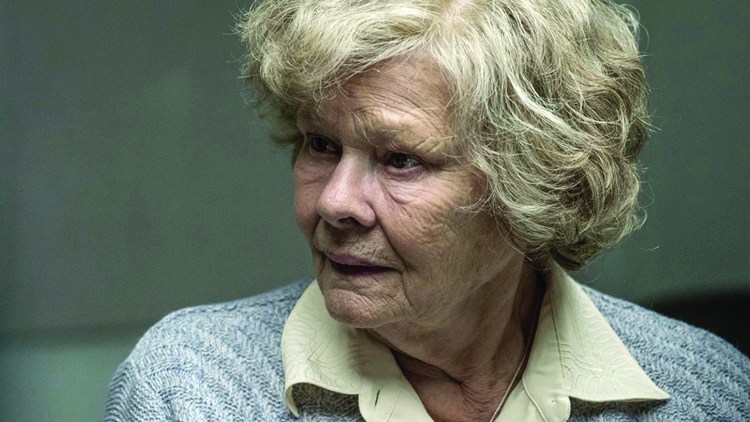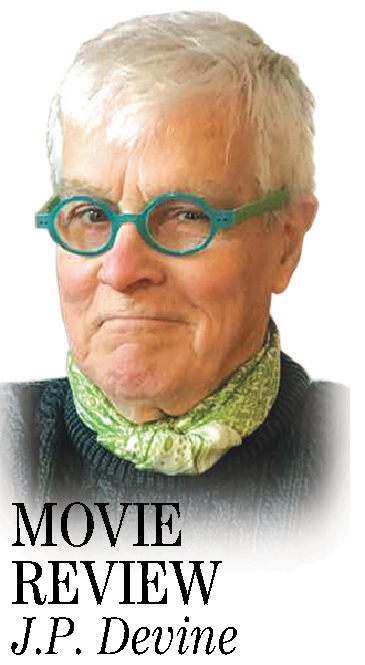England 1999: “Are you Joan Stanley?”
“Yes.”
“You’re under arrest for violating the national securities act.”
And with those words, life, as Joan Stanley knew it, changed forever.
And so it was for 80-year-old retired librarian Joan Stanley (Judi Dench) on this bright spring day in 2000 London.
Theater director Trevor Nunn brings to the screen the “kind of” real life story of Melita Norwood, here known as Joan, who, in the 1930s, fresh out of school, full of dreams and a pure soul, took a job with a secret British department that was struggling to develop Her Majesty’s atomic bomb.
From the opening moments of Joan’s arrest, the story flows into a series of flashbacks showing us that Melita, or Joan, played here as young woman by a splendid Sophie Cookson, was a dreamy communist. Real facts show that both her parents were active in socialist circles, and she was raised in that environment.
We’re told that Melita/Joan was a soft-hearted idealist and party member for years, and that she apparently took no money from the Soviets for her actions. When asked about her motives, she said, “I did what I did, not to make money, but to help prevent the defeat of a new system which had, at great cost, given ordinary people food and fares which they could afford, a good education and a health service.” Make of that what you will.
Nunn and writer Lindsay Shapero, with material taken from Jennie Rooney’s book “Red Joan,” change, for reasons known only to them, important names and dates.
Director Nunn gracefully dances his heroine back and forth between her hard work as a spy and the softer moments of a furtive love affair with her young Communist lover Leo (a fine Tom Hughes).
Leo, a tousled haired rake and student activist, takes advantage of Joan’s pure heart and slowly, very slowly, draws her into the shadowy world of the Soviet KGB.
There are others around Joan at the secret labs, who, while morally committed to peace and loyal to the Crown, seek the glory of giving Britain its bomb.
There is Max Davis (Stephen Campbell Moore), a married professor himself sucked into the vortex of Joan’s undercover life. Their lives will merge, and give the film its real heart.
Before the British can make their own breakthrough, the news comes that the U.S. has dropped its new bomb on the two Japanese cities of Hiroshima and Nagasaki.
It’s then that Joan naively decides she has to help the Soviets gain ground.
Nunn, working from Jennie Rooney’s 2013 novel “Red Joan,” delivers a straightforward story of the young idealist Melita and others like her in England of the 40s, when Soviet Russia was a friend and ally of the West.
Nunn is blessed with the presence of Dame Judi if only in her handful of scenes.
The rest of the film depends on the very able shoulders of young Sophie Cookson (“Moonfleet,” “Kingsman: The Secret Service”) and the talents of Stephen Moore and Tom Hughes.
The film is ably done with just the right amount of breath-catching moments, splendid performances, and clouds of the dark smoke of mendacity. But fire? Not all that much considering that it is offered as a sort-of-true war time romance and intrigue drama. But then, we have come to watch Dame Judi Dench seduce us with her brilliance, have we not?
There is much here to enjoy, and I liked it a lot. Still, there is a great deal of well-dressed cloak but not enough dagger to make me truly happy.
Given the dangerous games played by all, it could have used a few more dark hallways and slouch hats.
Despite Nunn’s and perhaps Rooney’s portrayal of Melita/Jones as a well meaning patriot, she was, after all, a spy and traitor.
Maybe the real heart of Melita and her story lies in her own words when at her unmasking in September 1999 she said to a reporter from the Times, “Oh dear. I thought I got away with it.” Did you now.
J.P. Devine, of Waterville, is a former stage and screen actor.
Send questions/comments to the editors.




Comments are no longer available on this story